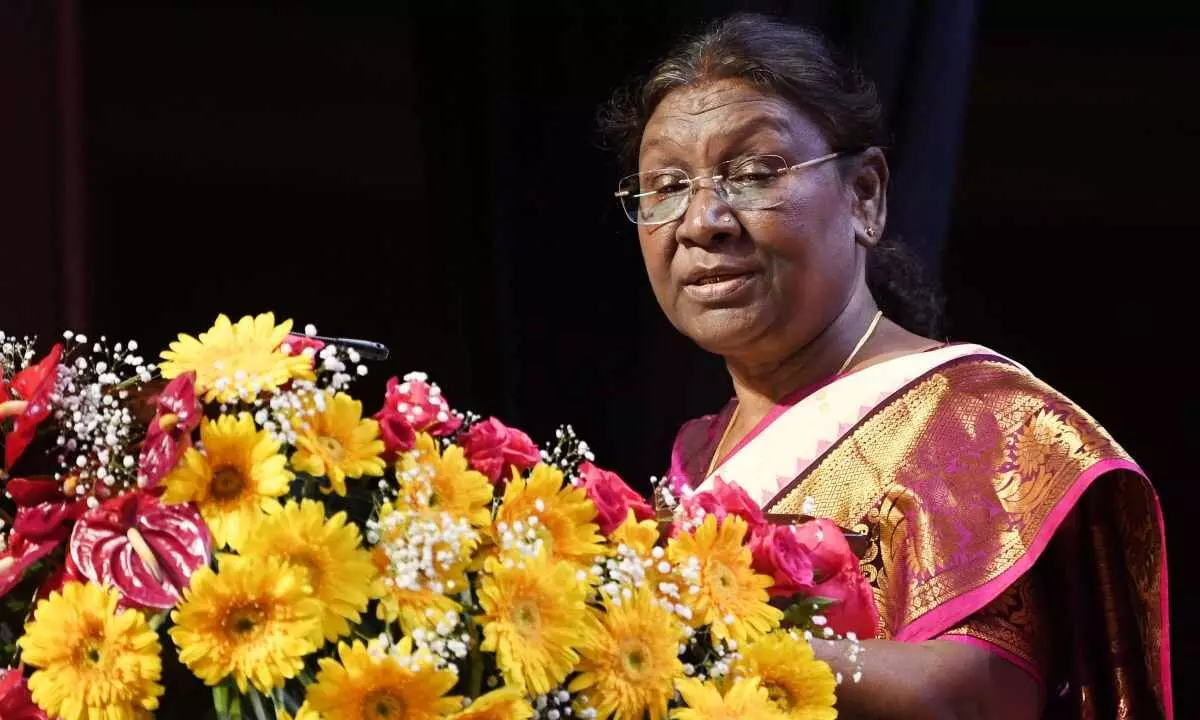Women's contribution in agri-food systems not recognized; need to change this story: Prez Murmu
Bulk of women are kept at bottom of pyramid of agriculture structure and they are denied the opportunities to climb the ladder, she said
image for illustrative purpose

New Delhi: President Droupadi Murmu on Monday said women's contribution in agri-food systems is not recognized and there is a need to change this story as they are "indispensable" in bringing food from farm to plate. Bulk of the women are kept at the bottom of the pyramid of the agriculture structure and they are denied the opportunities to climb the ladder and assume the role of decision-makers, she said.
In fact, the COVID-19 pandemic brought to the fore a strong correlation between the agri-food systems and structural inequality in society, she added. "Women sow, grow, harvest, process, and market the food. They are indispensable in making every grain reach from farm to plate. But still across the world, they are held back and stopped by discriminatory social norms, and barriers to knowledge, ownership, resources and social networks. "Their contribution is not recognized. Their role is marginalized. Their existence is denied in the whole chain of agri-food systems. This story needs to be changed," Murmu said, addressing a global conference on gender issues in agriculture.
In India, changes are being seen as women are getting more empowered through legislative and governmental interventions. There are many stories of women turning into successful entrepreneurs in this sector, she added. The four-day conference is being organised jointly by the Consortium of International Agricultural Research Centers (CGIAR) Gender Impact Platform and Indian Council of Agricultural Research (ICAR). Asserting that modern women are not helpless but powerful, the President called for "not only women's development but women-led development" to make agri-food systems more just and equitable. She further said "The irony is that as we enter the modern age, we are still grappling with the challenges of attaining just and resilient agri-food systems."
Although the agriculture sector remained resilient during COVID-19, the President said the pandemic brought to the fore a strong correlation between the agri-food systems and structural inequality in society. "At the global level, we have seen that women have been kept outside the agri-food systems for long. For example, women are unpaid workers, tillers, farmers in the field but not owners of the land," she said. Sharing how the crisis of COVID-19, conflict, and climate change have aggravated the challenges by the agri-food systems, the President said, "Climate change is an existential threat and the clock is ticking and we need to act now, fast and swiftly."
On one hand, climate change and the extinction of species are disrupting food production, on the other hand, the agri-food cycle is becoming unsustainable and not eco-friendly, she said. "Our agri-food systems are stuck in a vicious cycle. we need to break this chakravyuh (trap) and at the same time increase biodiversity and restore ecosystems so that our food and nutritional security can be assured," she stressed. The President also said that agriculture cannot be promoted solely on commercial consideration as this sector's social obligation is critical for the survival of humanity. She said the government has given a call for "vocal for local" and this needs to be adopted in the agri-food systems too.
Speaking on the occasion, Agriculture Minister Narendra Singh Tomar said women have played a key role in the country's agricultural growth. "We need to ensure gender equality and inclusiveness in the agri-food systems for better output... CGIAR and ICAR should identify gaps and address gender inequality in agriculture," he added.
Stating that women farmers are key for transformation not only for India but the whole world, ICAR Director General Himanshu Pathak said in developing countries, agriculture employs 80 per cent of rural women. Participation of women is 75 per cent in various crops, 80 per cent in horticulture and 50 per cent in post-harvest work and more than 95 per cent in animal husbandry and fishery. These numbers are even higher in African countries, he said. "Mainstreaming women farmers can bring a paradigm shift towards economic growth. The empowerment can be brought through technology backstopping, developing entrepreneurial skills, providing financial and market linkages besides enabling policy environment," he added.
CGIAR Executive Managing Director Andrew Campbell said women are more likely to be food insecure than men during times of crisis. The combined crisis of climate change, COVID-19, and conflict are hitting girls and women harder than men. "There are more than 150 million more women than men who are starving and hungry. This gap is eight times bigger now than it was in 2018. So in five years, it got eight times worse," he said and stressed that researchers and stakeholders should develop tools and insights to improve the ways in which we interact with rural communities.
According to CGIAR Gender Impact platform Director Nicoline de Haan, women are excluded from the opportunities to lead and benefit from the food systems. "Based on the current pace of progress, it would take nearly 300 years to close the gender gap and achieve equality. We need new research and innovation that can catapult women into the center of food systems," she said and called for embracing research for the next revolution. There is a need to demonstrate how gender and social science research is not only relevant but essential to achieve just and resilient food systems, she added. Ministers of State for Agriculture Kailash Choudhary and Shobha Karandlaje, and Agriculture Secretary Manoj Ahuja were also present at the event.

